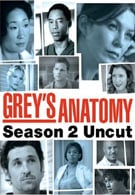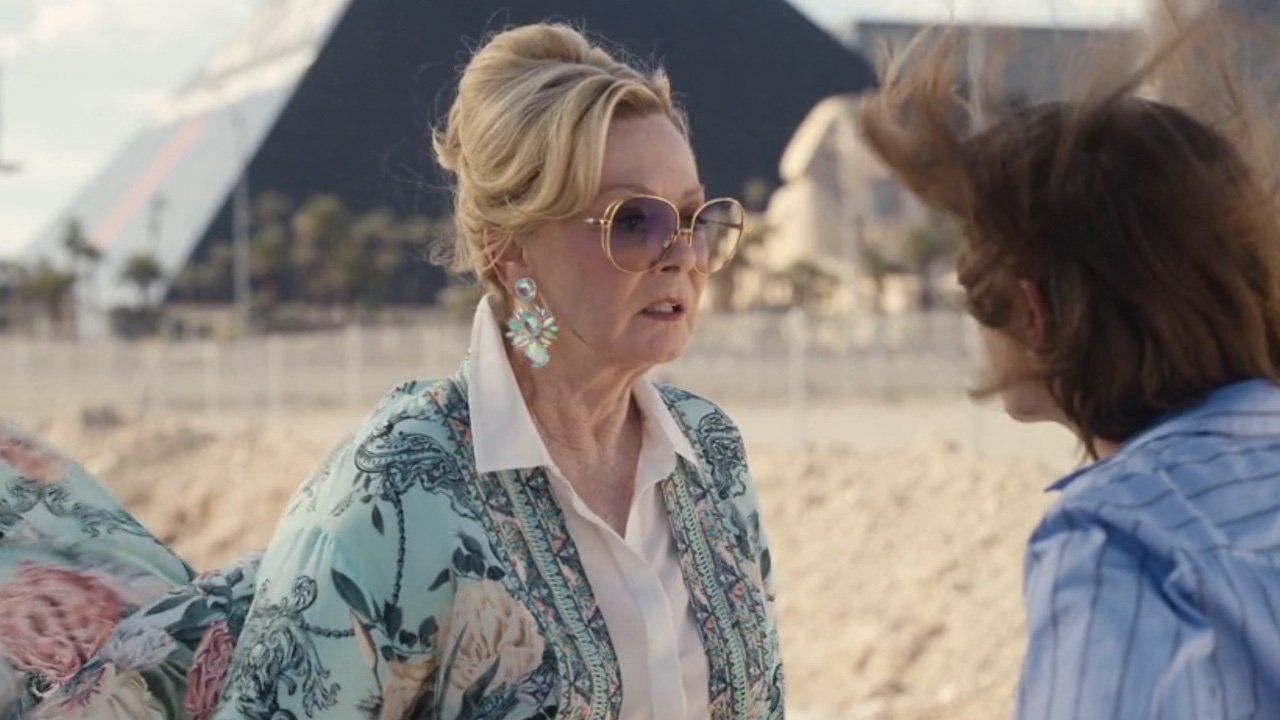After a first season of nine episodes, a rabid fanbase and critical acclaim, Buena Vista Home Entertainment has unleashed season two of Grey's Anatomy in all its uncut glory. For those interested in what all the buzz is about, newcomers will have no problem jumping right into this prime time soap opera with this extensive release that contains all 27 episodes and a plethora of bonus material. For those already familiar with the show, this is your chance to revisit the staff at Seattle Grace before season three starts up. "Seriously." Not clinical enough to call it a medical drama and not light-hearted enough to call it a comedy, Grey�s Anatomy injects you with 10 CCs of melodrama, 5 CCs of humor and 1 CC depth -- call it a primetime General Hospital. The second season of Grey's Anatomy kicks off with Meredith Grey (of the series' namesake) running into her brain surgeon boyfriend's, Dr. Derek Shepherd (aka Dr. McDreamy), wife. Thus, the second season�s driving plot line is in motion 15 minutes into the first episode of the season. From there, the season takes off on a series of episodes filled with twenty-something relationship angst, quirky medical quandaries and melodramatic set pieces that have little to no consequences.
Each episode is book-ended by Meredith's voiceover, which provides the episode's moral. Like a grown up Doogie Howser, Meredith waxes intellectual about her woes, as well the problems of her fellow medical interns - roommates Izzy and George, best friend Christina and obligatory jerk Alex. Each character is in love with another character they can't be with, except for Christina who represents the "together but separate" relationship. When they aren't sleeping with each other, the eager interns are knocking each other over to get the next ambulance full of mutilated car crash victims, gun shot wound patients and a plethora of oddball surgeries.
Pesky melodrama aside, the show does succeed in its quick wit and charming supporting cast. While Meredith, Izzy, George, Christina and Alex are whiney and annoying, Dr. Bailey (Chandra Wilson) along with Dr. Shepherd and Dr. Burke are a breath of fresh air. Dr. Bailey's strong characterization and knack for rattling off career-threatening remarks to interns makes her the most welcome on-screen character, while the down to earth Dr. Shepherd and Dr. Burke (Patrick Dempsey and Isaiah Washington, respectively) provide some contrast to their flighty female counterparts.
Truth be told, you don't need to watch every episode to enjoy Grey's Anatomy . In fact, you may even waste your time, as some episodes' plot lines revolve around events that never happened. Case in point, the episode "Damage Case" is driven by Dr. Shepherd finding out that Meredith spent the night at their dog's veterinarian when he brought the sick dog over late one night. However, that never happened in the previous episode. Instead, that tidbit was shown in the "last time on Grey's Anatomy " recap at the beginning of "Damage Case." Plot holes such as these and melodrama set pieces that are too coincidental to be remotely plausible undermine the show's one attempt at a meaningful theme.
Throughout the season, the show uses the idea of the surgeons' emotional disconnection as a plot device rather than exploring it as a theme. The characters lose patients in surgery and lovers in their personal lives, but there is never any true exploration of a doctor's need for an emotional disconnection if he or she is to continue to save lives and lose patients. The emotional disconnection is, instead, used to create tension in relationships; Christine is cold toward Burke, Meredith sleeps around to forget Derek, Derek's marriage fails because of being disconnected from his wife, and so on and so forth.
Yet, complaining that a weekly prime-time T.V. show isn't investigating any themes is rather moot. As a rule, television isn't a medium through which you gain a better understanding of the human condition. It's a quick fix, an escape from daily rigors, and Grey's Anatomy succeeds on that superficial level. It's fun, empty-headed entertainment with a twist of cleverness, but don't expect a feeling of accomplishment when you finish the second season on DVD; expect relief.
Season Highlights: "Make Me Lose Control," "Into You Like a Train," "Something to Talk About," "Thanks for the Memories," "Grandma Got Run Over By a Reindeer," "Break On Through," "It's the End of the World," "As We Know It," "Superstition," "17 Seconds," Deterioration of the Fight or Flight Response," "Losing my Religion." TV show box sets are exhausting. They are usually filled with hours of episodes that leave you too tired in the end to care about bonus material, and Grey's Anatomy Season Two UNCUT is no exception. Fortunately for die-hard fans of the show, this DVD set includes more footage than you would ever want to see. All of the 27 hour-long episodes are presented in 1.78 : 1 anamorphic widescreen to preserve the original high-definition recording. If you have caught a couple of shows on standard definition cable, this DVD set is a huge visual improvement; the image is crisp with deep blacks, vivid whites and a vibrant color spectrum, despite the bland hospital sets. However, if you were lucky enough to have a HD TV when this season aired, you're going to notice a decrease in visual quality when you pop these standard definition discs into your DVD player. Each episode is also presented in Dolby Digital 5.1. The mix isn't overly dramatic and it gets the job done without losing clarity in the center channel during simultaneous dialogue and music.
Although the video and audio are both exceptional, the subtitle feature is beyond annoying. Each time I started up an episode, the subtitles were automatically on. Even when I went to the set up screen and turn the subtitles off before I started an episode, the subtitles would magically appear when the episode began. The only solution was to use the subtitle button on my DVD remote. I also test this in my computer's DVD player and the subtitles came on every time. Granted it isn't a major issue, but when you sit down for a marathon episode session, turning the subtitles off every time becomes bothersome.
In addition to the uncut 27 episodes, four of those episodes (namely "Thanks For The Memories," "What Have I Done To Deserve This," "It's The End Of The World" and "Losing My Religion") are extended, which means there is about a minute of footage added in that you probably won't even notice. On the sixth disc, there are also deleted scenes from various episodes that were deleted for a reason - they are completely uninteresting. Additionally, there is commentary on five episodes. Featuring a revolving door of directors Jeff Melman and Peter Horton, creator Shonda Rimes, editors Susan Vaill and Edward Ornelas and actress Sandra Oh, the commentaries are mostly self-congratulatory with the occasional insight into how the show was filmed.
In the way of additional bonus material, disc six also features "The softer side of Dr. Bailey" that includes interviews about and with Chandra Wilson, who was nominated for an Emmy. The gist of the interviews is that Wilson is a wonderful and friendly person and a great actress. The "Creating Pink Mist" featurette dissects the creation of the visual effects for the explosion in "As We Know It." There is also a set tour that is hosted by James Pickens Jr. (Dr. Webber) and its best attribute is that it's short. "The Doctors are In" is a Q & A session with the cast, or at least Kate Walsh, Justin Chambers and T.R. Knight.
Also included the Jimmy Kimmel Show that aired after the season finale and features interviews with Katherine Heigl, James Pickens Jr. and Chandra Wilson. During the show, there is a cheap gag where Jimmy Kimmel is bitten by a poisonous snake and is taken to a hospital where he conducts his interviews with the Grey's Anatomy cast members. The gag doesn't come off as funny as it should, though the reaction of the audience is fairly amusing.
Hacks Went Back To Vegas, And It Made Me Miss The Old Seasons For One Big Reason
Tom Cruise's Running Style In The Mission: Impossible Films Is Iconic, And Apparently, It's Connected To One Of His Outsiders Co-Stars
Somebody Actually Used It’s Always Sunny In Philadelphia’s Musical To Propose, And It’s Weirdly Sweet











